All of us feel stress at some point in our lives. In fact, some amount of stress is healthy to motivate us and increase our performance, which is referred to as Eu – Stress. However if the stress reaches an overwhelming level wherein it hampers someone’s ability to function normally in day-to-day life, they start showing symptoms of a nervous breakdown.
“Eustress occurs when the gap between what one has and what one wants is slightly pushed, but not overwhelmed. The goal is not too far out of reach but is still slightly more than one can handle. This fosters challenge and motivation since the goal is in sight.
The function of the challenge is to motivate a person toward improvement and a goal. Challenge is an opportunity-related emotion that allows people to achieve unmet goals. Eustress is indicated by hope and active engagement. Eustress has a significantly positive correlation with life satisfaction and hope.”- Wikipedia
A nervous breakdown can be brought on by stress or anxiety caused due to any aspect of a person’s life: work, relationships, or finances.
“The term “nervous breakdown” is sometimes used by people to describe a stressful situation in which they’re temporarily unable to function normally in day-to-day life.
It’s commonly understood to occur when life’s demands become physically and emotionally overwhelming. The term was frequently used in the past to cover a variety of mental disorders, but it’s no longer used by mental health professionals today.
Nervous breakdown isn’t a medical term, nor does it indicate a specific mental illness. But that doesn’t mean it’s a normal or a healthy response to stress. What some people call a nervous breakdown may indicate an underlying mental health problem that needs attention, such as depression or anxiety.
Signs of a so-called nervous breakdown vary from person to person and depend on the underlying cause. Exactly what constitutes a nervous breakdown also varies from one culture to another. Generally, it’s understood to mean that a person is no longer able to function normally.
For example, he or she may:
• Call in sick to work for days or longer.
• Avoid social engagements and miss appointments.
• Have trouble following healthy patterns of eating, sleeping, and hygiene.
So what are the symptoms of a nervous breakdown? Read on to find out more.
11 Scary Symptoms of A Nervous Breakdown

1) Persistent Headaches
If you are suffering from unexplained headaches that don’t seem to go away, it could be one of the signs of a nervous breakdown.
Stress and anxiety are caused by tension that gets stored in the body and usually manifests physically as headaches, tightness of muscles, and shallow breathing. The jaw, neck, shoulders, and head are the most affected areas that usually end up as storehouses of tension in the body.
When you feel stressed, try doing gentle neck rolls, shoulder rolls, facial exercises, and deep breathing, you would instantly feel better.
Related: Types of Headaches: Which One Do You Have?
2) Irregular heartbeat
A nervous breakdown can manifest physically in a variety of forms but the irregularity of the heartbeat is the most common symptom.
It is because breath and mind are connected. Whenever we are stressed, our breath becomes irregular leading to an irregular heartbeat. Anxiety and panic attacks often lead to racy thoughts, heart palpitations, and irregular heartbeat. It can feel extremely frightening as the symptoms are similar to getting a heart attack.
Some people advise breathing deeply to calm down. But it can be a little difficult to practice deep breathing in the middle of a panic attack when your heart is pounding.
Instead try to do some mild exercises, like stretching or going for walks. It will get your blood pumping and release endorphins to make you feel better. Once you feel a little better, you can try deep breathing to calm yourself further.
3) Irregular sleep patterns
Depression or anxiety can seriously impact your sleeping patterns.
You may either suffer from Insomnia or oversleeping.
In both cases, your sleep is not restful and you wake up feeling tired and exhausted. To improve your sleeping pattern, try inculcating a moderate exercise routine like yoga or tai chi that will relax you both physically and mentally.
Try to do some deep breathing or meditation before going to sleep.
Also creating a soothing and distraction-free sleeping environment can help to improve your quality of sleep.

4) Mood swings
A nervous breakdown can often lead to extreme mood swings or unexplained outbursts of anger, irritability, crying, or other emotional responses that are way out of proportion to the current situation. Try to observe your mood swings and assess your behavior.

If they are too overwhelming and out of proportion with the current situation and you feel like you can’t resolve them on your own. Please reach out to your friends and family. You can also seek professional help from a counselor or psychiatrist.
There are lots of treatments like Talk therapy and Cognitive Behavioral Therapy that go a long way in helping to control extreme mood swings.
5) Inability to focus
A nervous breakdown leaves you feeling overwhelmed. It is accompanied by feelings of dread, paranoia, and hopelessness. Your mind is constantly struggling with what happened in the past, inducing guilt or what may happen in the future, inducing fear. You may find it hard to live in the present moment.
Due to this, you may struggle to do routine tasks and find it difficult to focus on any one task at hand. Try doing yoga, meditation, and deep breathing to bring your mind to the present moment and it will help to improve your focus and concentration skills.
Related: Press This Button On Your Body To Help Relieve Your Stress And Anxiety
6) Anxiety/Panic attacks
A nervous breakdown can manifest physically as anxiety with tense muscles, sweaty palms, dizziness, upset stomach, and trembling or shaking.

It can also lead to panic attacks, which include chest pain, pounding heart, heart palpitations, extreme sweating, shallow breathing, and extreme fear or a feeling of dissociating from reality or self. Or it can manifest in the form of nightmares or paranoia.
7) Changes in eating, leading to weight loss or weight gain
A nervous breakdown can also affect your eating habits. You may start eating too little or indulge in overeating leading to sudden changes in weight.
A lot of people indulge in emotional eating when they feel overwhelmed and gain a lot of weight. On the contrary, some people may lose their appetite due to stress and anxiety and lose a lot of weight.
It is important to be disciplined and eat a balanced diet. Seek help from a dietician or nutritionist if you are not able to maintain a healthy and balanced diet on your own.
Related: 6 Signs You Are Under More Stress Than You Can Handle
8) Gastrointestinal symptoms
Stress, anxiety, and nervousness have a direct impact on our stomach and gut health. Our digestive system is directly impacted by our mental health.
Stress, anxiety, and fear can lead to several gastrointestinal problems like diarrhea, constipation, or stomach pain. Excessive stress can also lead to Irritable Bowel syndrome or other autoimmune diseases.
9) Isolation and social withdrawal
Nervous breakdown or depression can make a person lose interest in the activities that he used to enjoy earlier. He may stop talking to friends or family and skip social events and gatherings, confining himself to his home.

10) Maintaining poor personal hygiene
A nervous breakdown can seriously impact a person’s ability to do even routine tasks like brushing teeth or taking a shower.
He may start neglecting his personal hygiene and may not pay any attention to his appearance or looks. This is one of the most alarming symptoms of a nervous breakdown if a person is not able to keep up with his daily personal hygiene and housekeeping tasks.
Related: 8 Self Soothing Techniques to Reduce Stress
11) Feeling helpless or hopeless
A nervous breakdown is often accompanied by depressive symptoms, such as helplessness, hopelessness, sadness, loss of interest in normal activities, and thoughts of suicide or self-harm.
What are the risk factors that can contribute to a nervous breakdown? A person may be at risk of a nervous breakdown when stress becomes too much for them to handle. It can be caused by any life event like:
• Stressful working conditions
• Traumatic events, such as a death in the family or loss of a loved one
• Financial crises such as serious debt or loss of job
• Poor sleeping, eating, and exercising habits
• Recent injury or illness diagnosis
If you can relate to any of the above-mentioned symptoms or feel you are on the verge of a breakdown, follow these strategies for managing your symptoms:
• Talk therapy (Counseling )or cognitive behavioral therapy (CBT)
• Prescriptions medicines like antidepressants or anti-anxiety medication can be used to treat chemical imbalances
• Holistic treatments, such as massage, Ayurveda, or yoga
• Practice meditation and deep breathing
• Cut caffeine, nicotine, and alcohol from your diet
• Develop a sleep schedule and routine that will help you sleep well. That can include taking a warm bath; meditation, and reading a book before bed.
Have you ever had a nervous breakdown in your life? Let us know your thoughts and experiences in the comments down below!
Frequently Asked Questions (FAQs)
What is the difference between a nervous breakdown and a mental breakdown?
A nervous breakdown and a mental breakdown are the same things, and both signify extreme emotional, mental, and psychological stress.
What happens when you have a nervous breakdown?
When you have a nervous breakdown you may feel that it’s impossible for you to handle any sort of emotional needs and responsibilities, and feel an overwhelming amount of anxiety and stress.
How long does it take to heal from a nervous breakdown?
Symptoms of a nervous breakdown normally last for a few days, and more in case of hospitalizations. Patients with severe mental illness tend to stay in a hospital for up to 10 days, or even more in extremely serious cases.

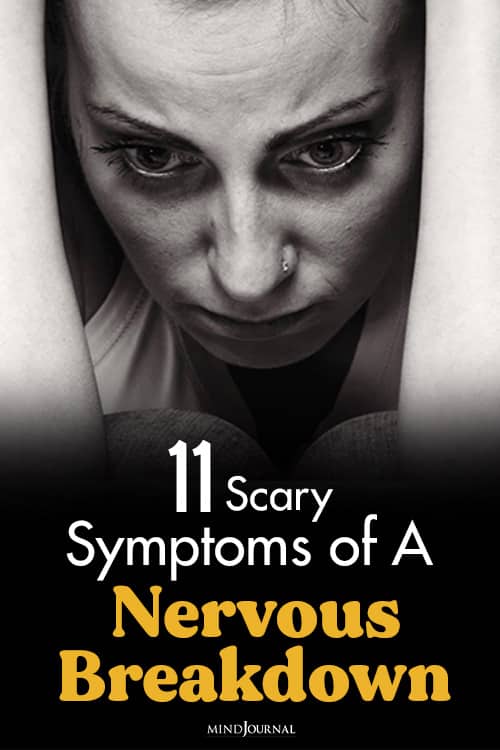
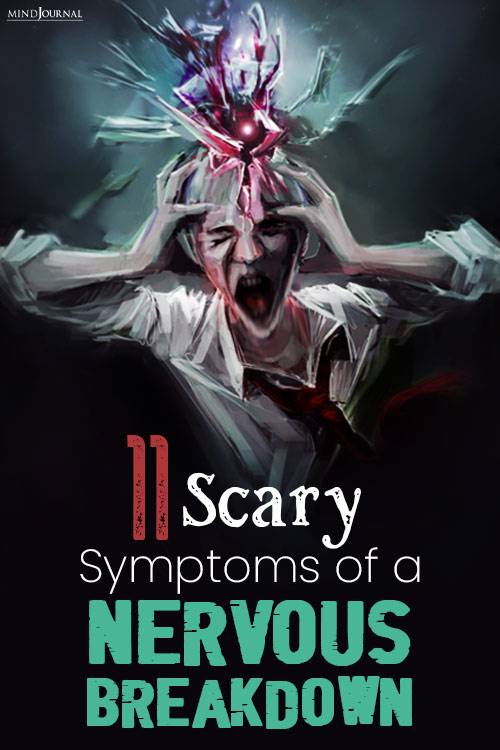


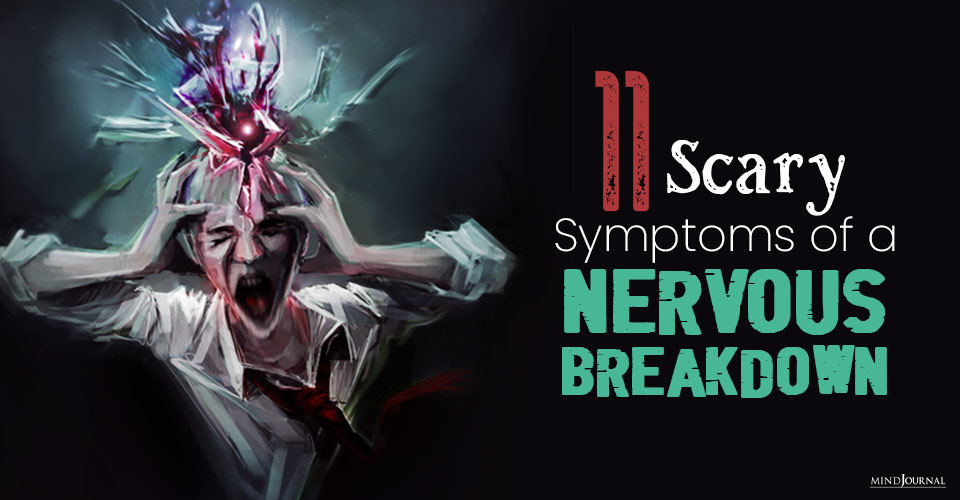



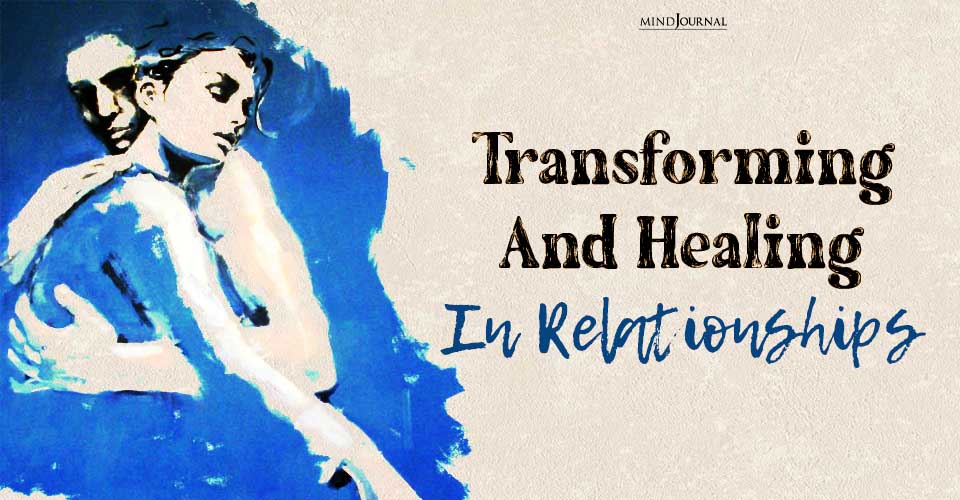
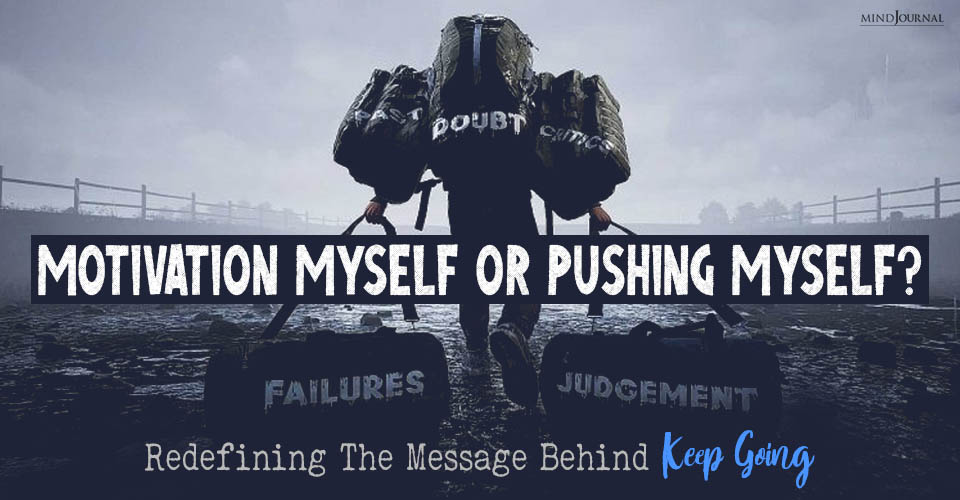


Leave a Reply